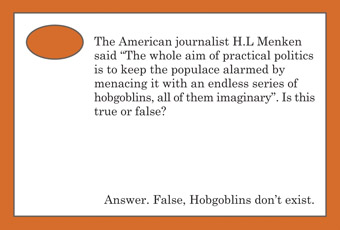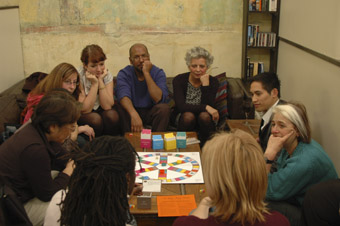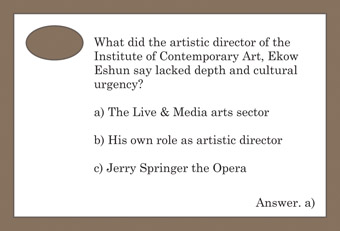 |
A.R.T. Pursuit, 2008, Yara El-Sherbini courtesy the artist, commissioned by The Delfina Foundation |
El-Sherbini’s practice is what Nicolas Bourriaud would characterise as Relational Art—art that relies on viewer interaction and participation. Previously she has deployed the format of the pub quiz and the patter of the stand-up comic; this piece is part of the Delfina Foundation’s series, With a small p, which explores game-playing to ask whether play can be a political gesture. I’m one of 24 participants who responded to the artist’s invitation to find out. After the delicious buffet supper, the room has the intimacy of an after-dinner game (one player longs for coffee and chocolates), even with so many people. We are arbitrarily divided into teams so from the outset there is a good chance of being among strangers, discussing potentially divisive issues which makes me wonder how it might be with a less liberal set of players.
The prototype on the table looks like any new board game. There are die and three letters—A,R,T—which the players must collect. The only indication we have that it’s an art object is a reminder to keep drinks away. Eventually, there will be a limited edition of 15 but this is almost irrelevant because the work exists in the playing. The use of modified games is not new to performance. In the 1970s Fluxus created many, most sold in inexpensive box sets through George Macunias’ Fluxfest store on Manhattan’s Canal Street. At Fluxus events too, people were asked to join in and play. However, the point of those games was that ultimately they were not really playable (the pack of cards consisting purely of Jokers; soccer played on stilts). A.R.T. Pursuit is the opposite. It’s extremely playable—for almost three hours.
 |
A.R.T. Pursuit, 2008 courtesy the artist, commissioned by The Delfina Foundation |
The questions themselves are topical, comic, and disturbing. How many people on America’s Most Wanted list are Muslims? Which parliament took an early recess so its members could get home on time to find out who shot JR? How much yearly profit did Charles Saatchi make by owning Damien Hirst’s The Physical Impossibility of Death in the Mind of Someone Living? There are a few with no apparent gravity (Who is the movie star Brad?) but by placing them alongside the weightier ones (What did Ralph Peters say works: ethnic cleansing or rechargeable batteries?), El-Sherbini reflects contemporary experiences of cyber-crawling whereby every headline is reduced to the same level of importance (today’s: “Men shot dead in US toy store” alongside “Truffle sells for 130K”). By requiring us as players to ask these questions (literally, to read them out), A.R.T. Pursuit alerts us to the fact that these are questions we should be asking anyway; all the time.
 |
A.R.T. Pursuit, 2008, Yara El-Sherbini courtesy the artist, commissioned by The Delfina Foundation |
Of course any game that has been altered in this way also draws attention to its own construction, to its rules. There are losers, and winners (eventually). Here, we become aware of a tension between intellect and plain old-fashioned winning. Teams are busy strategising. As players on Team Pink, we want to reduce the length of discussions by our opponents on Team Orange. (Are we scared that if they do too much talking they’ll get to the right answer?) Yet, in doing that, are we in danger of curtailing debate? Is this, in part, the point of the game?
The Enlightenment’s love of knowledge for its own sake has given way to knowledge as commodity. As Lyotard reminds us, postmodernist society needs to ask itself who is deciding which knowledges are paramount. Sometimes the answers to Yara El-Sherbini’s questions highlight the impossibility of the enterprise. Example: is money the root of all evil? If you were foolish enough to consider anything as the root of all evil, you should pass your turn. It’s in these humorous moments when we realise what a ridiculous and arbitrary pursuit the categorisation of knowledge is. A.R.T. Pursuit succeeds on so many levels: as a way of introducing thorny subjects, as a networking tool, as a thought-provoker, as an education. And you know what, it’s really good fun too.
Yara El-Sherbini, A.R.T. Pursuit, Delfina Gallery, London, Nov 27 & Dec 2, 2008
RealTime issue #90 April-May 2009 pg. 44
© Marie-Anne Mancio; for permission to reproduce apply to [email protected]








 back
back